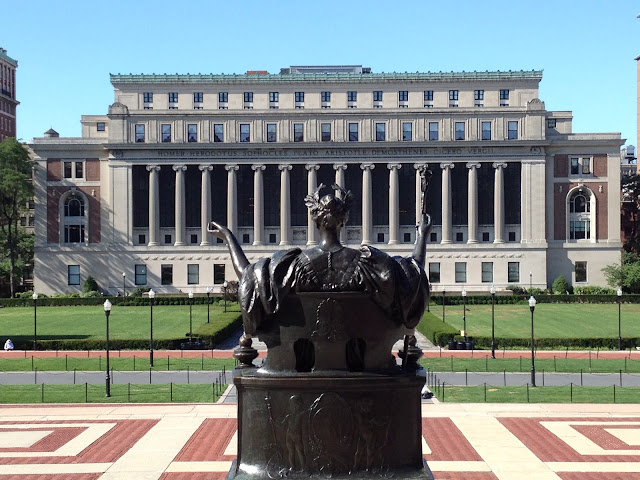.jpg) |
| Anna, left, Vronsky and Gizmo share a bite. |
Yesterday's column included lots of cats. Which might make it seem strange that I then thought, "More cats!"
It's not a subject I turn to much.
But it's mid-June. Time to slow down a bit. Here, in one of my first columns, I tell a story I've since repeated many, many times.
I hate to identify myself as a cat man. There is something, oh I don't know, dainty about male cat owners.
Cats are so feminine, after all. They don't have the rough and tumble manliness of dogs. No presidential candidate, surely, would allow himself to be photographed roughhousing with his cats.
But if those guys who collect Barbies, and line their apartments with custom shelves, can publicly admit it, then I suppose that I can cop to cats.
And besides, they're my wife's cats, really. Lord knows I hated them to begin with. I would have married her years earlier if she didn't have cats, if she didn't discipline them in a loud voice, at the breakfast table, while I cringed behind the morning paper.
We got married, despite the cats — a brother and sister pair, white with gray splotches, that she named Anna and Vronsky, for the doomed lovers in Anna Karenina.
Like other aspects of domestic life, the cats grew on me. Anna is a fat cat, a little mean, intelligent, single-minded in her pursuit of food. Vronsky is thin, sweet and somewhat dim.
They never leave the house. Bringing pets outdoors only causes problems, as evidenced by Tina Popplewell, who found herself in court last week after her dog got hit by a car and was saved by something called "Pet Rescue," which later tried to hold the animal hostage, apparently for ransom for the $810 owed for medical care.
I've learned to have a healthy skepticism about pet groups. They rain compassion down upon dumb animals yet always seem to suddenly yank it back when a human enters the picture.
There is some question over whether Popplewell offered to pay over time, and was rebuffed, or whether it was the other way around.
The woman did, however, strong-arm her dog back, which is not surprising. I know that should our cats, say, be kidnapped by Saddam Hussein and kept under less-than-ideal conditions in a cat prison in Baghdad, my wife — a slim, slight woman — wouldn't think twice before assembling a group of cat-loving mercenaries who, with faces blackened and AK-47s clutched to their chests, would make a low-level commando parachute drop over the desert. They'd get those cats back.
The snafu with Pet Rescue reminds me of the nightmare of getting our cats in the first place from the well-regarded Anti-Cruelty Society on LaSalle Street. There we saw Anna and Vronsky, about eight years ago, two tiny white kitties, huddled together in a bare cage.
My wife-to-be's heart melted. She wanted those cats. We went to fill out the paperwork — the Anti-Cruelty Society interrogates you to make sure you aren't going to serve your new pets for dinner or sell them to the Iraqis.
A line on the form demanded a landlord's consent. But her landlord wasn't available — it was a Saturday — and adoption was held up until he could be found.
"Oh," said the clerk, off-handedly, sending us away. "It looks like one of these kittens is sick. He might have to be put down tonight."
Well, my wife-to-be already loved those cats. While she stood distraught out on the sidewalk, I tried to grease the skids with the Anti-Cruelty Society volunteer.
"Look, this is Chicago," I said, winking largely, pulling out my wallet and thumbing through the twenties. "Surely, we can work something out. Maybe I can adopt the cats."
But the same rigidity that sent Pet Rescue to the cops stiffened the spines of the Anti-Cruelty Society — or the "Cruelty Society," as I later dubbed them. They sent us away, to search madly for my wife-to-be's landlord and pray that the little kitty wouldn't be dispatched to the compassion of the society's gas chambers before we could return.
Sunday dawned. We were there when they opened the doors, and bolted for the cage where the cats had been. Another woman was making a beeline for the two white kittens, but my wife-to-be gave her a Chris Chelios shoulder check and claimed them. "Those are my cats!" she shouted.
We hadn't found her landlord, but in true lawyerly style, she pointed out a line in her lease about pets not being permitted to "soil the sidewalks." Pets couldn't soil the sidewalk, she argued, ergo pets were permitted. A shaky case, but the Cruelty Society people bought it.
As the years passed, first she, then I, fell under the spell of the cats. Like many pet owners, each new day holds the prospect of being held hostage by skyrocketing medical costs. If we learned we had to mortgage our home to send one of the cats to the Mayo Clinic for a heart transplant, we might not snap at it, but we sure would give the situation hard thought.
That's what pets do to people — they burrow into your soul and stay there. Pet Rescue should be ashamed of itself for hounding this poor woman, if indeed it did.
And the woman, on the other hand, should pay what she owes, over time if necessary. It's only right.
—Originally published in the Sun-Times, Aug. 18, 1996
















.jpg)


















